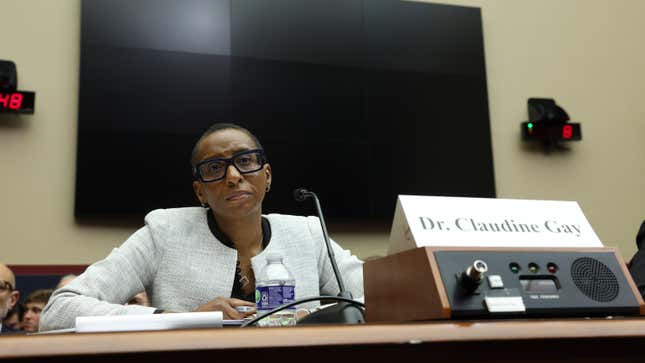
Claudine Gay is curtains as the first Black woman president of Harvard University.
We’ve heard the story by now: Mounting claims of plagiarism forced her to resign. But anyone paying attention knows that’s only part of the full picture.
Gay’s clock started ticking back in October, when Harvard became Ground Zero in the debate surrounding the Israel-Hamas conflict. A group of Harvard students guaranteed their future inability to be hired for jobs by placing blame on Israel in a letter. Though Gay released a statement condemning Hamas for the attack Oct. 10, it wasn’t quick enough for the tastes of many donors.
A few days after the U.S. Department of Education launched an investigation into Harvard over campus antisemitism, Gay, along with the presidents of University of Pennsylvania and the Massachusetts Institute of Technology, were dragged before Congress to discuss what they were doing to battle antisemitism on their respective campuses.
That hearing was an unmitigated disaster: When Gay was asked pointedly if calling for the genocide of Jews violates Harvard’s rules on bullying and harassment, she responded: “The rules around bullying and harassment are quite specific and if the context in which that language is used amounts to bullying and harassment, then we take, we take action against it.”
That Charmin-soft answer should have been a resounding “yes.” But she tried to toe the line in defense of free speech, and that’s not something the first Black woman president of Harvard can get away with. Folks didn’t like the comments of UPenn’s president, Elizabeth Magill, either, so she was shoved out of her job.
Harvard tried to protect Gay, but it could do so but for so long: Thanks to a cocktail of rich donors who believe that she was a diversity hire and good old-fashioned “conservative pundits” (read: racists), Gay had a target on her back that it wasn’t too hard to hit.
Accusations of plagiarism on her record, including on her 1997 Ph. D. dissertation, conveniently started floating around the time of her initial responses to the Israel-Hamas conflict. But it was an unsigned, 30-page complaint published on New Year’s Day that did her in.
By all accounts, Gay was at the very least sloppy about her academic citations, and several academics have said as much. At least one she’s accused of plagiarizing, University of Wisconsin, Madison Political Science professor David Canon, defended her.
“I am not at all concerned about the passages,” Canon told the Washington Free Beacon, the conservative rag that published the unsigned complaint. “This isn’t even close to an example of academic plagiarism.”
It’s beat into the heads of every journalist and academic to stay away from plagiarism — if I so much as cut and paste an unaltered sentence someone else wrote about Megan Thee Stallion’s shoe choice in a piece with my name on it, I’d be fired and my reputation ruined.
However, I have little doubt that Gay, as the first Black person and first woman to serve as Harvard’s president since the university was founded near the beginning of American chattel slavery, was as thoroughly vetted as Barack Obama was before anyone decided to allow a Black man to become a U.S. president.
Sure, she served as a dean at Harvard preceding her presidency, and her pedigree – with stints at Stanford University and Princeton University before completing her Ph. D. at Harvard – is Ivy League to the core. But you don’t make it to the big seat as the front person of the institution without some serious background digging – especially if you’re a Black woman.
As such, if Harvard allowed Gay to ascend to the presidency, the onus was on them to comb her previous works for plagiarism. Perhaps they did and decided, like Canon, that it didn’t qualify as plagiarism. If they let irreconcilable stealing go, however, shame on them.
But none of that changes the fact that Gay’s resignation was the result of a witch hunt that worked.

